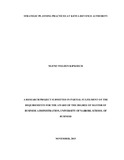| dc.description.abstract | The focus of the research was on the study of strategic planning practices at the Kenya Revenue Authority (KRA). Strategic planning has been viewed as a systematic process of envisioning a desired future and translating this vision into broadly defined goals or objectives and a sequence of steps to achieve them. Strategic planning is a means to an end, a method used to position an organization through prioritizing its use of resources according to identified goals in an effort to guide its direction and development over a period of time. This study, therefore sought to identify the strategic planning practices at Kenya Revenue Authority. The research adopted a case study design which was deemed appropriate because it involves a careful and complete observation of social units or a phenomenon and it also offers a comprehensive understanding of the social units or phenomenon under study. The primary data was collected using a comprehensive interview guide. Data collected was analyzed using content analysis. This is because the nature of data collected was qualitative in nature. The study concluded that Kenya Revenue Authority undertakes formal strategic planning in terms of environmental analysis and that it uses balanced scorecard approach on four perspectives of enhanced revenue collection, customer service enhancement, internal processes enhancement and people development initiatives. The Study also concludes that inadequate funding from treasury, inadequate employee involvement, ineffective coordination especially poor communication of strategic plans, time allocated for the planning, lack of a structured way of managing strategic planning practices, lack of needed resources for example specialized labour which is either non-existent or expensive were amongst the challenges affecting strategic planning practices at KRA. Further, the study concluded that the performance of entire organization relied heavily on the strategic plan set and thus it is a very important process that should be given greater support by all the managers and employees. The study also concluded that there is enhanced revenue collection at low cost because of effective strategic planning. The study recommends that the Authority continue use of formal strategic planning for continued effectiveness and efficiency. The Authority should however develop a strategic plan process to ensure appropriate focus on both the pre- and post-implementation challenges and should build employee trust and gain their commitment to the core values and objectives of the organization. Finally, the study recommends change of organizational structure and culture through restructuring and training to align to the organization‟s objectives. This is important in order to improve commitment within the organization so that employees can identify with their organization and its goals, and deliver the services more effectively and efficiently. | en_US |

